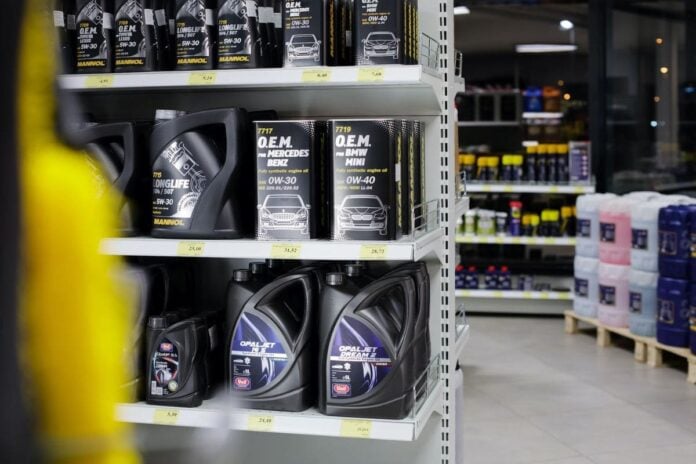Did you know that the engine oil is the lifeline for your car and if it is not checked when required, you could be looking at costly repairs or even an engine replacement. So, checking your oil, which is also known as black oil or lubricating oil, frequently should be a priority in your car maintenance routine.
Table of Contents
- When Do You Need to Change Your Engine Oil
- How to Choose the Right Engine Oil
- Synthetic vs Natural Engine Oil
Engine oil is the lifeline of your car. It provides lubrication for the many moving metal parts inside the engine. All machines require lubrication to run smoothly to reduce the amount of heat generated from the friction of moving components.
The engine oil also helps in dissipating heat and cleans the engine by removing any trapped debris in it.
So, here are some tips to help you understand when to change your engine oil.
When Do You Need to Change Your Engine Oil?

Some car owners might argue that their engine oil should be changed after reaching a certain mileage or from the number of months since its last change.
While this is true, you should also look for these five warning signs that indicate you might need to change your oil earlier than expected.
Problematic Engine
Clean and concentrated engine oil is able to lubricate and prevent the many metal components in an engine. But when the oil gains viscosity from dirt accumulation, it can no longer lubricate properly.
This will cause a knocking sound from the engine because of the friction between the metal components and cause your engine to overheat.
Color of Engine Oil

Clean, lubricating engine oil is usually transparent brown. However, the color becomes black due to the dirt and debris from the engine’s combustion. So, the next time you check the oil level, do the dipstick oil check. If you get a dirty dipstick with black liquid dripping on it, you need to change the engine oil.
How to Perform a Dipstick Check
- Remove and clean the dipstick of any oil particles.
- Reinsert the dipstick into the engine oil to check the oil level and color.
- If the oil is above the average level, some of the oil should be cleared so that it does not affect the performance of the engine.
- Clean the dipstick on a clean tissue to see the color of the oil.
Read More: How to Check the 6 Essential Car Oils & Fluids
Check Engine Light is On

If the check engine light starts to blink on your dashboard, it indicates that your car engine is low on black oil.
If the engine oil light is on, immediately check the oil level and add some if necessary. Take your vehicle to a nearby workshop for further inspection to prevent any serious damage from happening.
Increased Fuel Consumption
An increase in fuel or petrol consumption is also a sign your engine oil needs to be replaced. Proper, functioning engine oil should not be very concentrated and viscous as mentioned above.

Dirty engine oil will cause your engine components to work harder than usual, which, indirectly increases petrol consumption,
There is more to engine oils than just these warning signs. To get a car to drive with optimum performance, your engine has to perform at its best too and this also depends on the type of black oil that your car uses.
How to Choose the Right Engine Oil for Your Car
1. Manufacturing Make & Model

The first step in choosing the right lubricating oil is to know the make and model of your car. Newer car models are equipped with higher-performing engines and require special formulation to bring out optimum performance.
As a result, some car manufacturers have their own proprietary engine oil specifically made for their brand. You can mix with other third-party brands for a fraction of the cost, but it won’t make your car run at its full potential.
2. Driving Behavior

Your location and driving behavior also play a factor in choosing the right oil to use. Different environmental conditions (such as hot or cold climates, and paved or rocky roads, among others) can cause different problems for your car.
Typically, the engine oil replacement is based on how frequently, how far, and what type of terrain the car has driven on. If the car is frequently used or frequently driven on rocky terrain, its oil needs to be replaced sooner.
However, even if the car is rarely used or driven on a normal road, the oil still needs to be replaced according to the service schedule to avoid any damage to the engine.
Read More: Does a Loud Car Exhaust Do Anything?
3. Types of Engine Oil
There are three types of engine oil sold– mineral oils, semi-synthetic, and fully-synthetic. Each type of oil has its own advantages and disadvantages.
Therefore, it’s important to research factors such as viscosity level, temperature, resistance to sedimentation (sludge), and durability, before deciding. Synthetic vs natural engine oil, which is better for your car? More on that below.
4. Viscosity Level
When comparing engine oils, you might come across a code (a combination of numbers and letters) found on the packaging label. These codes refer to the viscosity level and durability measurements of the engine oil.
In general, there are two numbers that determine the viscosity level of engine oil:
- The first number ending in the letter ‘W’ refers to the flow of the oil in cold temperatures or when the engine is started.
- The second number refers to the flow of the oil during normal operating temperature.
Oils with low viscosity flow are easier to protect engine parts at cooler temperatures. High viscosity engine oils on the other hand, usually protect the engine better at higher temperatures.
You can choose the right viscosity level for your car by referring to the car manual provided by your car manufacturer.
5. Engine Oil Certification Standards
You will also find engine oil certification standards indicated using different acronyms. Here are some examples you’ll see on engine oil bottles:
- API (American Petroleum Institute)
- ACEA (European Automobile Manufacturers Association)
- ILSAC (International Lubricant Specification Advisory Committee)
- JASO (Japanese Automotive Standards Organization).
Certification standards from such organizations indicate that the product has met or exceeded the set requirements. Additionally, this certification standard is also one of the ways to ensure the quality and performance of these engine oils.
Synthetic vs Natural Engine Oil, Which is Better?
Before choosing the right engine oil for your car, it is imperative to know the types of engine oil for sale in the market:
Black Mineral Engine Oil
Black mineral oil is a type of lubricant oil derived from crude petroleum. It does not contain any synthetic additives and is more affordable than synthetic oil.
While cheap, the caveat of black mineral oils is they need more frequent replacement because the recommended mileage for this is around 5,000 km.
Black mineral oil is more suitable for older, non-performance cars or vehicles that are rarely used. It is the most cost-effective choice compared to semi-synthetic or full synthetic engine oil.
Semi-Synthetic Engine Oil
Semi-synthetic black oil is produced by blending black mineral oil and synthetic black oil.
It is denser than full synthetic black oil and specially formulated to provide better engine protection.
The recommended mileage for semi-synthetic black oil is approximately every 7,000 to 8,000 km.
It also offers better performance than black mineral oil at a more affordable price than full synthetic engine oil. Semi-synthetic engine oil is popular among car owners who want performance-on-a-bargain for daily drives.
Full Synthetic Engine Oil
Full synthetic black oil is entirely produced from synthetic materials and does not contain any genuine black mineral oil.
This type of black oil lasts longer and provides excellent engine protection. The recommended mileage for full synthetic black oil is every 10,000 km.
For modern car owners who prioritize engine performance and maximum protection in the engine, fully synthetic engine oil is the way to go.
Despite being the most expensive out of the bunch, it offers long-term benefits for modern cars with powerful engines.
Read More: Engine Oil Additives: Do They Really Work?
Get Your Engine Oil Changed at CARSOME Service Center From as Low as RM99!
Leaving your engine oil unchanged too long can damage your engine, and not to mention, devalues your car when trying to sell it.
At CARSOME service center, we have service packages including getting an oil change starting from RM99! Book your appointment here now!
